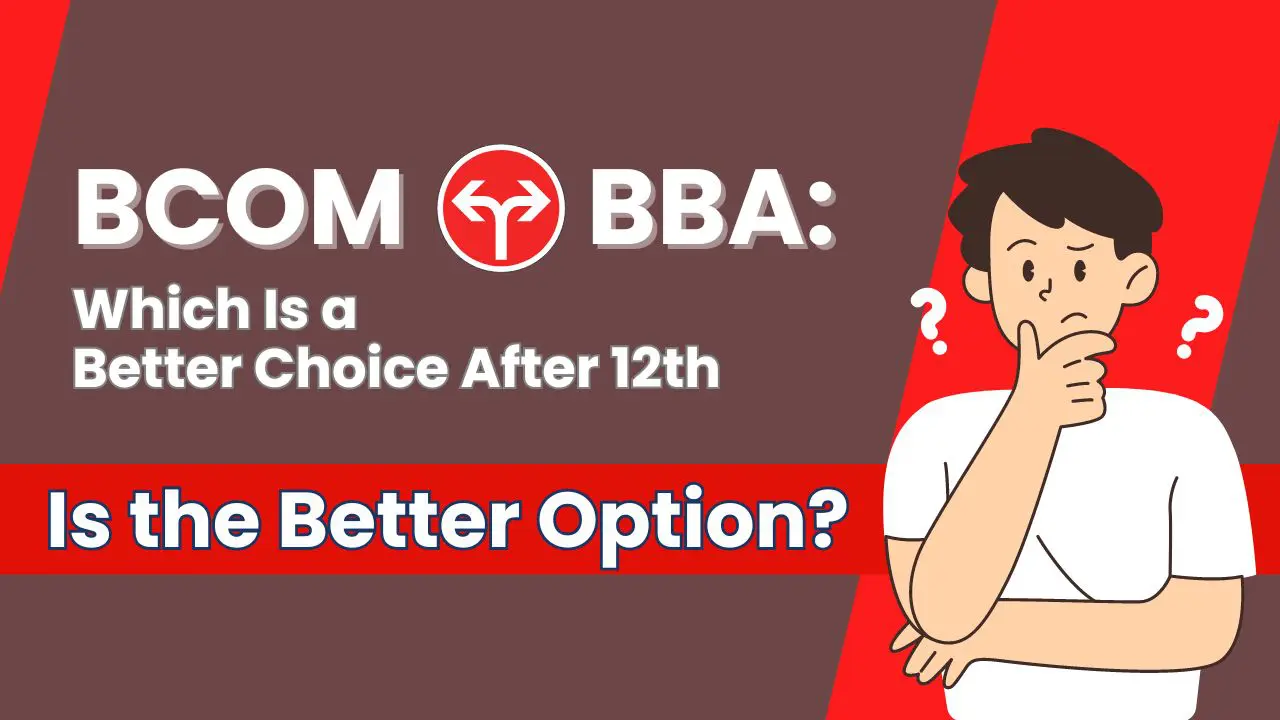Which Is a Better Choice After 12th: B.Com or BBA?

Introduction
Choosing between a Bachelor of Commerce (B.Com) and a Bachelor of Business Administration (BBA) after 12th grade can be a daunting task. Both degrees offer unique advantages and open doors to various career opportunities, but which is the best fit for you? This blog explores the key differences, scope, career prospects, and job roles associated with each degree. We’ll also address common questions like which is better for banking, which has more scope, and which is best for pursuing an MBA.
Understanding B.Com and BBA Degrees
To help you choose between B.Com and BBA, let’s first understand what each degree involves:
What Is B.Com?
B.Com, or Bachelor of Commerce, is a three-year undergraduate degree focusing on commerce, finance, accounting, economics, and business law. It provides a broad understanding of commerce-related subjects and is designed for those interested in careers in accounting, finance, taxation, and other related fields.
What Is BBA?
BBA, or Bachelor of Business Administration, is also a three-year undergraduate degree that focuses on business management, marketing, human resources, and entrepreneurship. It is designed for students who aspire to lead businesses or pursue managerial roles.
Comparing B.Com and BBA
To better understand the differences between B.Com and BBA, let’s compare their scope, specializations, and career opportunities.
| Aspect | B.Com | BBA |
| Scope | Focused on finance, accounting, economics, taxation | Focused on business management, marketing, HR, and entrepreneurship |
| Specializations | Finance, Accounting, Taxation, Corporate Law, Economics | Marketing, Human Resource Management, Entrepreneurship, Operations Management, Finance |
| Career Opportunities | Chartered Accountant, Auditor, Financial Analyst, Tax Consultant, Banker | Business Manager, Marketing Executive, HR Specialist, Entrepreneur, Operations Manager |
| Further Studies | Ideal for CA, CS, CMA, M.Com | Ideal for MBA and other business-related master’s programs |
Top Universities are offering Bcom online Programs with Top Specialisation, with a Scholarship
| University Name | Full Fee | Semester Fee | EMI Fee | Duration |
| Amity | 95000 | 16000 | 2639 | 3 Years |
| Jain | 127500 | 21250 | 2500/Month | 3 Years |
| Manipal | 75000 | 12500 | 2083 | 3 Years |
Top Universities are offering BBA online Programs with Top Specialisation, with a Scholarship
| University Name | Full Fee | Semester Fee | EMI Fee | Duration |
| Amity | 160000 | 27000 | 4449 | 3 Years |
| Jain | 165000 | 27500 | 2500/Month | 3 Years |
| Manipal | 135000 | 22500 | 3750 | 3 Years |
| DY Patil | 120200 | 20000 | NA | 3 Years |
Scope of B.Com and BBA
Both B.Com and BBA offer a range of career opportunities. Here’s a comparison of the scope of each degree:
| Scope Aspect | B.Com | BBA |
| Career Paths | Careers in finance, accounting, auditing, taxation, banking | Careers in business management, marketing, HR, entrepreneurship |
| Core Subjects | Commerce, finance, accounting, taxation, economics | Business management, marketing, HR, entrepreneurship |
| Advanced Studies | Ideal for CA, CS, CMA, and M.Com | Ideal for MBA and other business-related master’s programs |
| Industry Sectors | Finance, banking, accounting, corporate taxation | Business management, marketing, human resources |
B.Com Specializations and Scope
B.Com offers various specializations that cater to different career paths. Here are some common B.Com specializations:
- Finance and Accounting
- Taxation and Auditing
- Corporate Law
- Economics
- Banking and Insurance
Scope of B.Com
The scope of B.Com is quite broad, encompassing careers in accounting, finance, taxation, and auditing. B.Com graduates can pursue roles like Chartered Accountant (CA), Company Secretary (CS), and Cost Management Accountant (CMA). It is also a preferred choice for those interested in careers in banking and insurance.
BBA Specializations and Scope
BBA also offers a range of specializations that focus on business management and entrepreneurship. Here are some common BBA specializations:
- Marketing
- Human Resource Management
- Entrepreneurship
- Operations Management
- Finance
Scope of BBA
The scope of BBA is focused on business management and entrepreneurship. BBA graduates can pursue careers in marketing, human resources, operations management, and business development. This degree is often chosen by those who aspire to leadership roles in business or who want to start their own businesses.
Job Roles After B.Com and BBA
After completing B.Com or BBA, graduates have a wide range of job opportunities. Here are some common job roles for each degree:
| Degree | Job Roles |
| B.Com | Accountant Auditor Financial Analyst Tax Consultant Bank Officer CA |
| BBA | Marketing Executive HR Executive Operations Manager Business Consultant Entrepreneur |
Future of BBA and B.Com
Both B.Com and BBA have promising futures, with diverse career opportunities and potential for further studies.
Future of B.Com
B.Com graduates often pursue advanced certifications like CA, CS, or CMA, leading to specialized roles in finance and accounting. The future for B.Com graduates includes careers in corporate finance, banking, taxation, and auditing.
Future of BBA
BBA graduates often continue their studies with an MBA, opening doors to executive and managerial roles. The future for BBA graduates includes leadership positions in marketing, HR, and business development, as well as opportunities to start their own businesses.
Which Is Best for Banking: BBA or B.Com?
Both B.Com and BBA can lead to careers in banking, but B.Com has a stronger focus on finance and accounting, making it a preferred choice for banking roles. B.Com graduates can pursue positions such as bank officers, financial analysts, and investment advisors. BBA graduates can also enter banking, but they may focus more on business development and management roles within the banking sector.
Conclusion
Choosing between B.Com and BBA after 12th grade depends on your career goals, interests, and desired career path. B.Com offers a broader scope in finance and accounting, while BBA focuses more on business management and entrepreneurship. Both degrees offer promising futures with diverse career opportunities.
To make the best choice, consider your interests, long-term goals, and the type of job roles that align with your aspirations. Whether you choose B.Com or BBA, both degrees provide a strong foundation for successful careers in business and commerce. Good luck with your decision!

